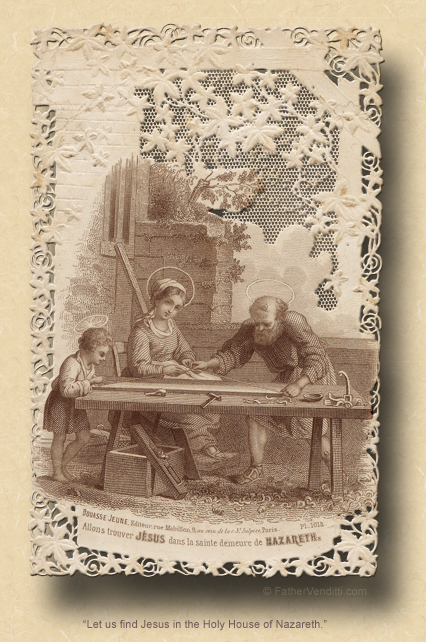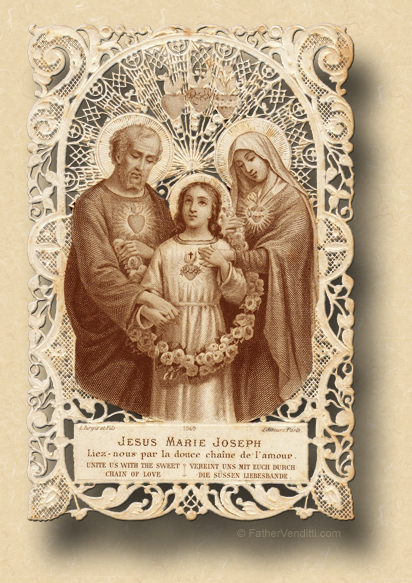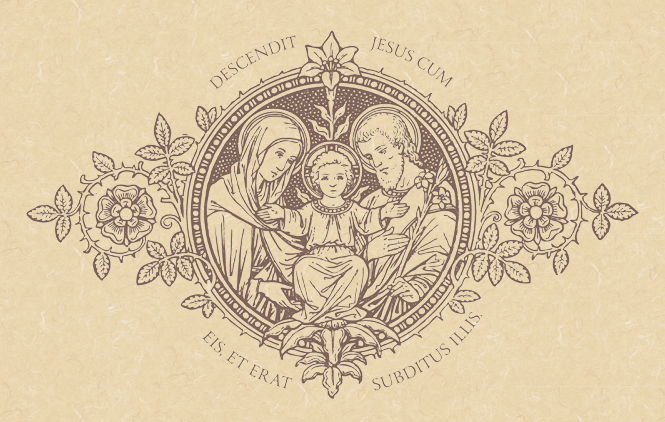When Love Hurts.
The Sunday within the Octave of the Nativity of the Lord: the Feast of the Holy Family of Jesus, Mary & Joseph.
Lessons from the secondary dominica, according to the ordinary form of the Roman Rite:*
• Sirach 3: 2-6, 12-14.
[or, Genesis 15: 1-6; 21: 1-3.]
• Psalm 128: 1-5.
[or, Psalm 105: 1-4, 6-9.]
• Colossians 3: 12-21.
[or, Colossians 3: 12-17.]
[or, Hebrews 11: 8, 11-12, 17-19.]
• Luke 2: 22-40.
[or, Luke 2: 22, 39-40.]
The Sunday within the Octave of the Nativity of Our Lord.**
Lessons from the dominica, according to the extraordinary form of the Roman Rite:
• Galatians 4: 1-7.
• Psalm 44: 3, 2.
• Luke 2: 33-40.
FatherVenditti.com
|
 8:18 AM 12/31/2017 — Pope Blessed Paul VI once said that “The home of Nazareth is the school where we begin to understand the life of Jesus—the school of the Gospel” (Paul VI at Nazareth, 5 January 1964). But the first lesson we learn at that school is a lesson on silence. The whole of the Old Testament foretells our Lord's coming. The Holy Gospels relate to us the Annunciation, the Visitation, the birth and preparation of the Baptist, the birth of our Blessed Lord Himself, His circumcision and presentation in the temple, and then … silence. Silence until the Baptist, busy at preaching repentance and baptizing, spies a young Man in His early thirties walking toward him and proclaims: “Behold, the Lamb of God, who takes away the sin of the world” (John 1: 29 NABRE). 8:18 AM 12/31/2017 — Pope Blessed Paul VI once said that “The home of Nazareth is the school where we begin to understand the life of Jesus—the school of the Gospel” (Paul VI at Nazareth, 5 January 1964). But the first lesson we learn at that school is a lesson on silence. The whole of the Old Testament foretells our Lord's coming. The Holy Gospels relate to us the Annunciation, the Visitation, the birth and preparation of the Baptist, the birth of our Blessed Lord Himself, His circumcision and presentation in the temple, and then … silence. Silence until the Baptist, busy at preaching repentance and baptizing, spies a young Man in His early thirties walking toward him and proclaims: “Behold, the Lamb of God, who takes away the sin of the world” (John 1: 29 NABRE).
We want to suppose that part of the book has been ripped out, a reel of the movie missing. Where are the cutesie-pie stories of our Lord's childhood? Where do we see Him walking upright for the first time, speaking His first words, learning to read, learning the rudiments of His father's carpenter's trade? But, when you think about it, these are the parts of all our lives that are usually the silent ones. When you're preparing to apply for a new job and you start to put together a resume, you never include in it: “I was potty-trained on March 4th, 1964.” You don't imagine that your prospective employer wants to know that. If he does, you should consider applying someplace else.
But we're not talking here about the biography of some ordinary person; we're talking about the life of our Lord, God and Savior, Jesus Christ, and we want to know everything. After all, everything our Blessed Lord says and does is a lesson for us, pointing for us the way to heaven; but, a significant chunk of our Lord's life has been denied to us; most of it, in fact. Our Lord begins His public ministry at the age of thirty, and goes to His cross at the age of thirty-three.  Almost everything that happened before then is missing … everything except, of course, one event, when our Lord was twelve years old and found in the Temple after having been lost, which we read on this feast a couple of years ago, the only event that breaks the silence of the Gospels about the hidden years of Jesus (cf. Catechism of the Catholic Church, 534). The lesson for the feast this year is that of the Presentation, which we heard just recently and will hear again on the Feast of the Presentation in February. Almost everything that happened before then is missing … everything except, of course, one event, when our Lord was twelve years old and found in the Temple after having been lost, which we read on this feast a couple of years ago, the only event that breaks the silence of the Gospels about the hidden years of Jesus (cf. Catechism of the Catholic Church, 534). The lesson for the feast this year is that of the Presentation, which we heard just recently and will hear again on the Feast of the Presentation in February.
An interesting question raised by these various episodes, which we never seem to ask ourselves, is: where did Saint Luke get this information? He never knew Jesus personally. And those of you here every day will remember, from his feast day not too long ago, that Luke isn't from Palestine: he's a Greek from Antioch, so there's no chance he would have known any of our Lord's family or friends growing up, and he doesn't write his Gospel until he meets Saint Paul around the year 44. How does he know about things that happened when our Lord was twelve years old? None of the other Gospels have anything to say about our Lord's childhood: Matthew, Mark, John are all silent about these events. I like to think that he learned about them from our Lord's Mother. The Holy Gospel does say at one point: “…his mother kept all these things in her heart” (2: 51 NABRE). How would Luke even know that unless She, Herself, had told him?
It is, of course, part of our spiritual tradition to look at the Holy Family of Nazareth with profound reverence: we idolize them, we look to them as the model of all families. That can either inspire us or make us feel deprived, depending on what our own family history is like. But the lesson should not be lost on us that, as special as the Holy Family of Nazareth was—a Mother conceived without sin, a Father completely disposed to the will of God, a Son Who is God—it was still, in many more ways than we tend to think, a very normal family.  The episodes of our Lord’s childhood that the Blessed Evangelist reports for us, however he may have learned of them, proves that. And it takes us back again to the last week of Advent, wherein we were given to read of our Lord's Foster Father and how he came to receive his commission from an angel: The episodes of our Lord’s childhood that the Blessed Evangelist reports for us, however he may have learned of them, proves that. And it takes us back again to the last week of Advent, wherein we were given to read of our Lord's Foster Father and how he came to receive his commission from an angel:
When God decided to redeem man and come to earth, I suppose He could have done it anyway he wanted. He could have just appeared, fully grown. If He had wanted to be a bit more dramatic, he could have arrived the way Elijah departed this world, on a fiery chariot. But instead He chose to be born as other men are born: to a human mother, in a real family. That choice was deliberate. It wasn't an accident. He didn't have to do it that way, but the first thing that the God-man blessed with His presence on earth was a home.
Everything that's worth something in this life costs a little pain. And in this sense, there's nothing more expensive than love. It's impossible to love without risking some hurt; but, is it better, therefore, not to love? When couples live together without benefit of marriage, as so many do these days, they will often defend their actions saying, "It's better than getting hurt. What if it doesn't work out?" But there's something noble in the risk. It's that willingness to take the risk of pain that says to the other person, "I am loved." Maybe that's the reason that couples who live together before marriage often don't stay together, even after they're married.
There is nothing in this life more risky and more able to cause us pain than our own families. But is there even one among us who would be willing to get rid of them? They give us security, they teach our children virtue, they are the very foundation on which civilization is based. And sometimes they hurt us. Maybe that's why they're in danger. The family is threatened by a movement bent on completely redefining it. Men pretending to marry men, women pretending to marry women, then suing Catholic adoption agencies for not giving them children. Maybe the reason so many people are willing to tolerate these things is because they've been hurt too many times. The solid family, based on a monogamous marriage, is a risky business.
But was it less risky for the Holy Family of Nazareth? Mary's family didn't believe that She was pregnant by the Holy Spirit. Who would? Would you have? And Joseph's family couldn't believe their eyes when he married Her anyway. And there was no conjugal love between the two, as the Church teaches that She remained a virgin all Her life. That's enough of a strain on any marriage.
It is a sad fact of life that it hurts sometimes to live in a family. And families that are resolved to stay together often find themselves very much like sheep among wolves, very much like the Seventy Disciples whom our Lord sent out in one of the Gospel lessons we'll read sometime after this season is over.  When, at the beginning of that passage, our Lord says that the harvest is plentiful but the laborers are few, many people just assume he's talking about the Holy Priesthood. But this event in the life of our Lord occurs long before Jesus chooses His twelve apostles. These men He sends out to preach the kingdom are laymen. We can presume that many of them had families. And our Lord charges them not to be concerned with how they're going to survive on their mission, but to be confident that God will provide. The decision to marry and start a family is a courageous one, trivialized by those who marry but who don't start families which is essentially an act of cowardice. When, at the beginning of that passage, our Lord says that the harvest is plentiful but the laborers are few, many people just assume he's talking about the Holy Priesthood. But this event in the life of our Lord occurs long before Jesus chooses His twelve apostles. These men He sends out to preach the kingdom are laymen. We can presume that many of them had families. And our Lord charges them not to be concerned with how they're going to survive on their mission, but to be confident that God will provide. The decision to marry and start a family is a courageous one, trivialized by those who marry but who don't start families which is essentially an act of cowardice.
From baptism onward every Christian is called by Christ to perform a mission. For those who have embraced the covenant of marriage, that mission lies in the raising of children in the faith. Maybe they feel ready for the burdens of family life and maybe they don't; but, ready or not they have accepted the call. They are like the Seventy which the Lord sent forth, not concerned about purse or bag or sandals, or what they were to eat or where they were to stay. Those seventy knew only that Christ had given them a mission, and nothing was going to prevent them from fulfilling it. They were prepared to sacrifice everything for him.
Pray to the Holy Family of Nazareth. Take courage from how normal a family they were. Take inspiration from how Holy they were. But pray to them. Make them the personal patrons of your own family. When your family is in turmoil, when everyone's fighting with each other and not speaking to each other and hurling verbal and emotional abuse on each other, as all families do at one time or another, pray to the Holy Family. Ask them for the grace to help make your home into the carpenter shop at Nazareth.

* On this feast, the first through third lessons are odinarily constant, while only the Gospel lesson changes with the dominical cycle; however, alternates for the first through third lessons are provided for the secondary and tertiary dominicas to be used at the discretion of the priest. This year, two alternates are listed for the third lesson and an altrnate for the fourth because shorter versions of these lessons are also available.
** In the extraordinary form, the Feast of the Holy Family is observed on the Sunday following Epiphany.
|

